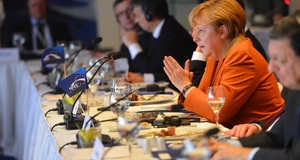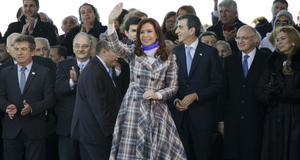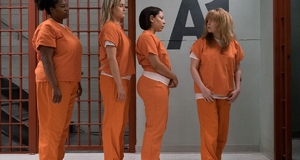|
From Interstate - Journal of International Affairs VOL. 2015/2016 NO. 1 Why are Gender Relations Important to Include in the Study of Politics and Society?
By Michael Rose
Interstate - Journal of International Affairs
2015, Vol. 2015/2016 No. 1 | pg. 2/2 | «
Throughout history and still throughout much of the world, the only time that women are relied upon in terms of economics and the maintenance of the public sphere is during wartime. War plays a fundamental role in the study of politics; for Clausewitz, war was merely ‘the continuation of politics by other means’.23 However within all aspects of the concept, the importance of gender relations cannot be understated, from the agreement of peace to the strategy of victory.
The conception of the private woman and public man has conceded predestined roles for the two socially accepted genders. Stereotypically, wars revolve around men; the gender starts, fights, and ends them. Women therefore act as support, stabilising society in the absence of men. These gender-based roles within warfare have had numerous repercussions for refugees, for the process of peace, and on the manner in which the individual is affected by war.
Gender relations are inherent in the notion of the refugee; a man must face pressure from his society, which coerces him to fight in its war, whereas a woman must protect her children. There are three stages for a refugee, and gender relations play a role in each of them. The first being the evacuation of the war zone, which is where ‘man’ faces difficulty, for violence is directed at this gender in the public role it possesses. Instead the woman must retain her private role and protect her children. Women and children are often, in this scenario, described as a single entity – ‘women-and-children’ – portraying the woman, like the children, as an apolitical victim of war, with no other role to play. 24
This role encourages her to escape the warzone, whilst the man must stay and fight. The second and third stages involve the transition from the war zone to either a refugee camp or by way of immigration to a safer nation. Gender relations are again relevant, for in the first instance it is not believed to be ‘right’ for a woman to be travelling alone without a child and it can therefore be more difficult for a woman to find asylum. ‘Women with children are more likely to be granted asylum in France as they are seen as fulfilling their motherly duties’.25 During this stage it is also certainly easier for a man due to the stereotyped vision of the ‘beneficial-for-society’ public gender.26
Gender relations also influence the manner in which the individual is affected by conflict. Gender roles in war stereotypically prescribe physical violence and possibly death to a man during conflict, whilst a woman may face sexual violence. During the Rwandan genocide 75% of women experienced some form of sexual violence.27 The term ‘comfort women’ is used to refer women and girls forced into sexual slavery by the Imperial Japanese Army before and during World War II.28
Sexual violence is an institutionalised aspect of war and due to gender stereotypes, is an aspect that society expects only to affect women, just as society expects physical combat to only affect men. Both these assumptions are obviously false. Not only do these assumptions of gender relations in war mean that those affected in a manner unexpected are hardly recognised, but it also means that those affected cannot feel confident enough to tell of it. Throughout the world men have been directly affected by sexual violence in war – ‘a study of 6,000 concentration-camp inmates in Sarajevo found that 80% of men reported having been raped’. It is also noticeable from the same study that of 4,076 NGOs that have addressed wartime sexual violence only 3% of them mentioned the experience of men.29
Finally in terms of war, gender relations are also relevant in the process of peace. In October 2010, Secretary of State Hillary Clinton said that “the only way to...reduce the number of conflicts around the world, to build sustainable peace – is to draw on the full contributions of both women and men in every aspect of peace-making, peacekeeping, and peace building.”30 The needs and wishes of all genders must be recognised in the process of peace and not merely that which represents men. It is noticeable however that the UN itself has never appointed a woman as Chief or Lead Mediator in the peace talks it has sponsored.
The lack of representation of women in these roles can unfortunately be considered as the sole reason that it was not until June 2008 that the UN recognised sexual violence as a tactic of war.31 This has had a negative side effect in that much of the aid received by a nation in the aftermath of a war is used for ‘disarmament, demobilization and reintegration (DDR) programs’, whilst those aspects of the community which played no role in combat are ignored. This leads directly to gender preferences purely out of the roles enforced by society.32
It is clear that gender relations play a vibrant role in each aspect of political and societal study discussed in this essay. From the preservation of feminised poverty, to the gendered hierarchy prevalent in religion, gender relations can be seen everywhere in politics. This essay has deconstructed the study of politics and society, finding the importance of gender relations in the debate over what is the public sphere, as well as recognising the importance of an analysis of education and exhibiting the gender education gap that appears in society. Finally this essay dissected the processes of war and it has shown the effects that unequal gender relations have had in the processes of war, and therefore the importance of its consideration. It is only by recognising the importance of gender relations that there can be any hope of equality.
Academy for International Conflict Management and Peacebuilding United States Institute of Peace, n.d. Gender, war, and peace building. [Online] Available at: http://www.usip.org/sites/default/files/files/NPECSG12.pdf [Accessed 21 March 2015].
Anon., 2006. RE-VISITING THE ‘FEMINISATION OF POVERTY’ AND THE UNDP GENDER INDICES: WHAT CASE FOR A GENDERED POVERTY INDEX? [Online] Available at: http://www.lse.ac.uk/ genderInstitute/pdf/fempov.pdf [Accessed 20 March 2015].
Bible Hub, n.d. Bible Hub. [Online] Available at: http://biblehub.com/ genesis/2-22.htm [Accessed 13 April 2015].
Clausewitz, C., 1984. On War. New Jersey: Princeton University Press. d'Eaubonne, F., 1974. Le féminisme ou la mort. II.
Donald, K., 2012. The feminisation of poverty and the myth of the 'welfare queen'. [Online] Available at: https://www.opendemocracy.net/5050/kate- donald/feminisation-of-poverty-and-myth-of-welfare-queen [Accessed 20 March 2015].
Duignan, B., 2015. Robert Nozick. [Online] Available at: http:// www.britannica.com/EBchecked/topic/421354/Robert-Nozick [Accessed 09 April 2015].
Enloe, C., 1992. The Gendered Gulf’ Collateral Damage: the new world order at home and abroad. Boston: South End Press.
European Parliament, 2014. Election Results. [Online] Available at: http:// www.europarl.europa.eu/elections2014-results/en/election-results-2014.html [Accessed 13 April 2015].
Freedman, J., 209.., ‘Protecting Women Asylum Seekers and Refugees: From International Norms to National Protection?’ I. [Online] Available at: http:// onlinelibrary.wiley.com/doi/10.1111/j.1468-2435.2009.00549.x/pdf [Accessed 20 March 2015].
Godoy, L., 2003. Understanding poverty from a gender perspective. Santiago: United Nations Publications the Women and Development Unit of the Economic Commission for Latin America and the Caribbean (ECLAC).
Good, C., 2013. Why Have So Many States Banned Abortions? [Online] Available at: http://abcnews.go.com/Politics/OTUS/states-banned-abortions/ story?id=18703520 [Accessed 09 April 2015]. Hanisch, C., 1969. The Personal Is Political. [Online] Available at: http:// www.carolhanisch.org/CHwritings/PIP.html [Accessed 13 April 2015].
Harrison, S., 2013. Abortion in Ireland: divorcing Church from State? [Online] Available at: http://www.bbc.co.uk/news/world-europe-23061276 [Accessed 09 April 2015].
Heywood, A., 2012. Political Ideologies. New York: Palgrave Macmillan. KANDAWASVIKA-NHUNDU, R., 2009. The Gender of Democracy Matters. [Online] Available at: https://www.opendemocracy.net/article/idea/ the-gender-of-democracy-matters [Accessed 20 February 2015].
Kannan, S., 2011. The relevance of gender to our understanding of war refugees. [Online] Available at: http://www.e-ir.info/2011/05/12/the- relevance-of-gender-to-our-understanding-of-war-refugees/ [Accessed 21 March 2015].
Lynch, K. & Feeley, M., 2009. Gender and Education. European Commission.
Mir-Hosseini, Z., 2006. Muslim Women’s Quest for Equality: Between Islamic Law and Feminism. [Online] Available at: https://www.amherst.edu/ system/files/media/0207/Mir-Hosseini%2520Muslim%2520Women%2527s %2520Quest.pdf [Accessed 09 April 2015].
Moghadam, V.M., 2004. The Gender of Democracy: The Link Between Women's Rights and Democratization in the Middle East. [Online] Available at: http://carnegieendowment.org/2008/08/20/gender-of-democracy-link- between-women-s-rights-and-democratization-in-middle-east/fmkc [Accessed 12 February 2015].
Pomeroy, C., 2010. Redefining Public and Private in the Framework of a Gendered Equality. [Online] Available at: http://serendip.brynmawr.edu/ sci_cult/courses/knowbody/f04/web3/cpomeroy.html [Accessed 21 March 2015].
Rawls, J., 1971. A Theory of Justice. Boston: Harvard University Press. Skills, D.f.E.a., 2007. Education and Gender: the evidence on pupils in England. [Online] Available at: http://webarchive.nationalarchives.gov.uk/ 20130401151715/http://www.education.gov.uk/publications/ eOrderingDownload/00389-2007BKT-EN.pdf [Accessed 08 April 2015]. Smith, S., 1997. Engels and the Origin of Women's Oppression. [Online] Available at: http://www.isreview.org/issues/02/engles_family.shtml [Accessed 09 April 2015].
Steinmetz, K., 2014. This is what 'Cisgender' Means. [Online] Available at: http://time.com/3636430/cisgender-definition/ [Accessed 13 April 2015]. Storr, W., 2011. The rape of men: the darkest secret of war. [Online] Available at: http://www.theguardian.com/society/2011/jul/17/the-rape-of- men [Accessed 23 March 2015].
The Asian Woman's Fund, n.d. Who were the Comfort Women?-The Establishment of Comfort Stations. [Online] Available at: http:// www.awf.or.jp/e1/facts-01.html [Accessed 23 March 2015].
UNESCO, 2010. adult and youth literacy: global trends in gender parity. [Online] Available at: http://www.unesco.org/education/ild2010/ FactSheet2010_Lit_EN.pdf [Accessed 09 April 2015]. Welch, S., Gruhl , , Rigdon , S. & Comer, J., 2009. Understanding American Government. Cengage Learning.
World Health Organisation, n.d. What do we mean by "sex" and "gender"? [Online] Available at: http://www.who.int/gender/whatisgender/en/ [Accessed 17 February 2015].
- Oxford Dictionaries, ‘Politics’ Available at: http://www.oxforddictionaries.com/definition/english/ politics [Accessed on: 17/02/2015]
- World Health Organisation, ‘What do we mean by "sex" and "gender"?’ Gender, women and health, (2015) Available at: http://www.who.int/gender/whatisgender/en/ [Accessed on: 17/02/2015]
- Steinmetz, K. ‘This is what ‘Cisgender’ Means’ (23.12.2014) Available at: http://time.com/3636430/ cisgender-definition/ [Accessed on: 13.04.2015]
- Heywood, A, ‘Feminism’, in Political Ideologies: An Introduction, (New York, Palgrave Macmillan, 2012), p. 235.
- Heywood, A, ‘Ecologism’, in Political Ideologies: An Introduction, (New York, Palgrave Macmillan, 2012), p. 274.
- d'Eaubonne, F. ‘Le féminisme ou la mort.’ (Vol. 2. P. Horay, 1974.)
- Smith, S. ‘Engels and the Origin of Women's Oppression’ International Socialist Review Issue 2 (1997) Available at: http://www.isreview.org/issues/02/engles_family.shtml [Accessed on: 09/04/2015]
- Heywood, A, ‘Feminism’, in Political Ideologies: An Introduction, (New York, Palgrave Macmillan, 2012), p. 235
- Duignan, B. ‘Robert Nozick’ Encyclopædia Britannica Online (2015) Available at: http:// www.britannica.com/EBchecked/topic/421354/Robert-Nozick [Accessed on: 09/04/2015]
- Rawls, J, ‘A Theory of Justice’ (Harvard University Press, 1971)
- Hanisch, C. ‘The Personal is Political’ (1969) Available at: http://www.carolhanisch.org/CHwritings/ PIP.html [Accessed on: 13.04.2015]
- Bible Hub, Available at: http://biblehub.com/genesis/2-22.htm [Accessed on: 13.04.2015]
- Welch, Susan; Gruhl, John; Rigdon, Susan; Comer, John, ‘Understanding American Government’ (Cengage Learning, 2009) pg.150
- Good, C. ‘Why Have So Many States Banned Abortions?’ (ABC news, 2013) [Online] Available at: http://abcnews.go.com/Politics/OTUS/states-banned-abortions/story?id=18703520 [Accessed on: 09/04/2015]
- Harrison, S. ‘Abortion in Ireland: divorcing Church from State?’ (BBC News, 2013) [Online] Available at: http://www.bbc.co.uk/news/world-europe-23061276 [Accessed on: 09/04/2015]
- European Parliament, ‘Election Results’ (2014) Available at: http://www.europarl.europa.eu/ elections2014-results/en/election-results-2014.html [Accessed on: 13.04.2015]
- Mir-Hosseini, Z. ‘Muslim Women’s Quest for Equality: Between Islamic Law and Feminism’ (University of Chicago, 2006) Available at: https://www.amherst.edu/system/files/media/ 0207/MirHosseini%2520Muslim%2520Women%2527s%2520Quest.pdf [Accessed on: 09/04/2015]
- --
- Department for Education and Skills, ‘Gender and Education: the evidence on pupils in England’ (the Department for Education and Skills, Nottingham, 2007, pg.3) [Online] Available at: http:// webarchive.nationalarchives.gov.uk/20130401151715/http://www.education.gov.uk/publications/ eOrderingDownload/00389-2007BKT-EN.pdf Accessed on: 08/04/2015]
- Donald, K. ‘The feminisation of poverty and the myth of the 'welfare queen' 50.50. Inclusive Democracy [Online] (06/03/2012) Available at: https://www.opendemocracy.net/5050/kate-donald/ feminisation-of-poverty-and-myth-of-welfare-queen [Accessed on: 20/03/2015]
- Chant, S. ‘RE-VISITING THE ‘FEMINISATION OF POVERTY’ AND THE UNDP GENDER INDICES: WHAT CASE FOR A GENDERED POVERTY INDEX?’ (March, 2006, pg.28-29) Available at: http://www.lse.ac.uk/genderInstitute/pdf/fempov.pdf [Accessed on: 20/03/2015]
- UNESCO, ‘adult and youth literacy: global trends in gender parity’ (2010) Available at:http:// www.unesco.org/education/ild2010/FactSheet2010_Lit_EN.pdf [Accessed on: 09/04/2015]
- Clausewitz, C ‘On War’ (New Jersey: Princeton University Press. 1984). p. 87.
- Enloe, C., ‘The Gendered Gulf’ Collateral Damage: the new world order at home and abroad’ (Boston: South End Press, 1992), p. 96
- Freedman, J., ‘Protecting Women Asylum Seekers and Refugees: From International Norms to National Protection?’ International Migration (2009) Accessed by: http://onlinelibrary.wiley.com/doi/ 10.1111/j.1468-2435.2009.00549.x/pdf [Accessed on: 20/03/2015]
- Kannan, S. ‘The relevance of gender to our understanding of war refugees’ (2011) Available at: http://www.e-ir.info/2011/05/12/the-relevance-of-gender-to-our-understanding-of-war-refugees/ [Accessed on: 21/03/2015]
- Academy for International Conflict Management and Peacebuilding United States Institute of Peace, ‘GENDER, WAR & PEACEBUILDING’ (pg.5) Available at: http://www.usip.org/sites/default/files/ files/NPECSG12.pdf [Accessed on: 21/03/2015]
- Asian Woman’s Fund, ‘Who were the Comfort Women? -The Establishment of Comfort Stations’ Available at: http://www.awf.or.jp/e1/facts-01.html [Accessed on: 23/03/2015]
- Storr, W. ‘The rape of men: the darkest secret of war’ The Guardian [Online] (17th July 2011) Available at: http://www.theguardian.com/society/2011/jul/17/the-rape-of-men [Accessed on: 23/03/2015]
- Academy for International Conflict Management and Peacebuilding United States Institute of Peace, ‘GENDER, WAR & PEACEBUILDING’ (pg.3) Available at: http://www.usip.org/sites/default/files/ files/NPECSG12.pdf [Accessed on: 21/03/2015]
- Academy for International Conflict Management and Peace building United States Institute of Peace, ‘GENDER, WAR & PEACEBUILDING’ (pg.12) Available at: http://www.usip.org/sites/default/files/ files/NPECSG12.pdf [Accessed on: 21/03/2015]
- Academy for International Conflict Management and Peace building United States Institute of Peace, ‘GENDER, WAR & PEACEBUILDING’ (pg.3-4) Available at: http://www.usip.org/sites/default/files/ files/NPECSG12.pdf [Accessed on: 21/03/2015]
Academy for International Conflict Management and Peacebuilding United States Institute of Peace, n.d. Gender, war, and peace building. [Online] Available at: http://www.usip.org/sites/default/files/files/NPECSG12.pdf [Accessed 21 March 2015].
Anon., 2006. RE-VISITING THE ‘FEMINISATION OF POVERTY’ AND THE UNDP GENDER INDICES: WHAT CASE FOR A GENDERED POVERTY INDEX? [Online] Available at: http://www.lse.ac.uk/ genderInstitute/pdf/fempov.pdf [Accessed 20 March 2015].
Bible Hub, n.d. Bible Hub. [Online] Available at: http://biblehub.com/ genesis/2-22.htm [Accessed 13 April 2015].
Clausewitz, C., 1984. On War. New Jersey: Princeton University Press. d'Eaubonne, F., 1974. Le féminisme ou la mort. II.
Donald, K., 2012. The feminisation of poverty and the myth of the 'welfare queen'. [Online] Available at: https://www.opendemocracy.net/5050/kate- donald/feminisation-of-poverty-and-myth-of-welfare-queen [Accessed 20 March 2015].
Duignan, B., 2015. Robert Nozick. [Online] Available at: http:// www.britannica.com/EBchecked/topic/421354/Robert-Nozick [Accessed 09 April 2015].
Enloe, C., 1992. The Gendered Gulf’ Collateral Damage: the new world order at home and abroad. Boston: South End Press.
European Parliament, 2014. Election Results. [Online] Available at: http:// www.europarl.europa.eu/elections2014-results/en/election-results-2014.html [Accessed 13 April 2015].
Freedman, J., 209.., ‘Protecting Women Asylum Seekers and Refugees: From International Norms to National Protection?’ I. [Online] Available at: http:// onlinelibrary.wiley.com/doi/10.1111/j.1468-2435.2009.00549.x/pdf [Accessed 20 March 2015].
Godoy, L., 2003. Understanding poverty from a gender perspective. Santiago: United Nations Publications the Women and Development Unit of the Economic Commission for Latin America and the Caribbean (ECLAC).
Good, C., 2013. Why Have So Many States Banned Abortions? [Online] Available at: http://abcnews.go.com/Politics/OTUS/states-banned-abortions/ story?id=18703520 [Accessed 09 April 2015]. Hanisch, C., 1969. The Personal Is Political. [Online] Available at: http:// www.carolhanisch.org/CHwritings/PIP.html [Accessed 13 April 2015].
Harrison, S., 2013. Abortion in Ireland: divorcing Church from State? [Online] Available at: http://www.bbc.co.uk/news/world-europe-23061276 [Accessed 09 April 2015].
Heywood, A., 2012. Political Ideologies. New York: Palgrave Macmillan. KANDAWASVIKA-NHUNDU, R., 2009. The Gender of Democracy Matters. [Online] Available at: https://www.opendemocracy.net/article/idea/ the-gender-of-democracy-matters [Accessed 20 February 2015].
Kannan, S., 2011. The relevance of gender to our understanding of war refugees. [Online] Available at: http://www.e-ir.info/2011/05/12/the- relevance-of-gender-to-our-understanding-of-war-refugees/ [Accessed 21 March 2015].
Lynch, K. & Feeley, M., 2009. Gender and Education. European Commission.
Mir-Hosseini, Z., 2006. Muslim Women’s Quest for Equality: Between Islamic Law and Feminism. [Online] Available at: https://www.amherst.edu/ system/files/media/0207/Mir-Hosseini%2520Muslim%2520Women%2527s %2520Quest.pdf [Accessed 09 April 2015].
Moghadam, V.M., 2004. The Gender of Democracy: The Link Between Women's Rights and Democratization in the Middle East. [Online] Available at: http://carnegieendowment.org/2008/08/20/gender-of-democracy-link- between-women-s-rights-and-democratization-in-middle-east/fmkc [Accessed 12 February 2015].
Pomeroy, C., 2010. Redefining Public and Private in the Framework of a Gendered Equality. [Online] Available at: http://serendip.brynmawr.edu/ sci_cult/courses/knowbody/f04/web3/cpomeroy.html [Accessed 21 March 2015].
Rawls, J., 1971. A Theory of Justice. Boston: Harvard University Press. Skills, D.f.E.a., 2007. Education and Gender: the evidence on pupils in England. [Online] Available at: http://webarchive.nationalarchives.gov.uk/ 20130401151715/http://www.education.gov.uk/publications/ eOrderingDownload/00389-2007BKT-EN.pdf [Accessed 08 April 2015]. Smith, S., 1997. Engels and the Origin of Women's Oppression. [Online] Available at: http://www.isreview.org/issues/02/engles_family.shtml [Accessed 09 April 2015].
Steinmetz, K., 2014. This is what 'Cisgender' Means. [Online] Available at: http://time.com/3636430/cisgender-definition/ [Accessed 13 April 2015]. Storr, W., 2011. The rape of men: the darkest secret of war. [Online] Available at: http://www.theguardian.com/society/2011/jul/17/the-rape-of- men [Accessed 23 March 2015].
The Asian Woman's Fund, n.d. Who were the Comfort Women?-The Establishment of Comfort Stations. [Online] Available at: http:// www.awf.or.jp/e1/facts-01.html [Accessed 23 March 2015].
UNESCO, 2010. adult and youth literacy: global trends in gender parity. [Online] Available at: http://www.unesco.org/education/ild2010/ FactSheet2010_Lit_EN.pdf [Accessed 09 April 2015]. Welch, S., Gruhl , , Rigdon , S. & Comer, J., 2009. Understanding American Government. Cengage Learning.
World Health Organisation, n.d. What do we mean by "sex" and "gender"? [Online] Available at: http://www.who.int/gender/whatisgender/en/ [Accessed 17 February 2015].
Endnotes
- Oxford Dictionaries, ‘Politics’ Available at: http://www.oxforddictionaries.com/definition/english/ politics [Accessed on: 17/02/2015]
- World Health Organisation, ‘What do we mean by "sex" and "gender"?’ Gender, women and health, (2015) Available at: http://www.who.int/gender/whatisgender/en/ [Accessed on: 17/02/2015]
- Steinmetz, K. ‘This is what ‘Cisgender’ Means’ (23.12.2014) Available at: http://time.com/3636430/ cisgender-definition/ [Accessed on: 13.04.2015]
- Heywood, A, ‘Feminism’, in Political Ideologies: An Introduction, (New York, Palgrave Macmillan, 2012), p. 235.
- Heywood, A, ‘Ecologism’, in Political Ideologies: An Introduction, (New York, Palgrave Macmillan, 2012), p. 274.
- d'Eaubonne, F. ‘Le féminisme ou la mort.’ (Vol. 2. P. Horay, 1974.)
- Smith, S. ‘Engels and the Origin of Women's Oppression’ International Socialist Review Issue 2 (1997) Available at: http://www.isreview.org/issues/02/engles_family.shtml [Accessed on: 09/04/2015]
- Heywood, A, ‘Feminism’, in Political Ideologies: An Introduction, (New York, Palgrave Macmillan, 2012), p. 235
- Duignan, B. ‘Robert Nozick’ Encyclopædia Britannica Online (2015) Available at: http:// www.britannica.com/EBchecked/topic/421354/Robert-Nozick [Accessed on: 09/04/2015]
- Rawls, J, ‘A Theory of Justice’ (Harvard University Press, 1971)
- Hanisch, C. ‘The Personal is Political’ (1969) Available at: http://www.carolhanisch.org/CHwritings/ PIP.html [Accessed on: 13.04.2015]
- Bible Hub, Available at: http://biblehub.com/genesis/2-22.htm [Accessed on: 13.04.2015]
- Welch, Susan; Gruhl, John; Rigdon, Susan; Comer, John, ‘Understanding American Government’ (Cengage Learning, 2009) pg.150
- Good, C. ‘Why Have So Many States Banned Abortions?’ (ABC news, 2013) [Online] Available at: http://abcnews.go.com/Politics/OTUS/states-banned-abortions/story?id=18703520 [Accessed on: 09/04/2015]
- Harrison, S. ‘Abortion in Ireland: divorcing Church from State?’ (BBC News, 2013) [Online] Available at: http://www.bbc.co.uk/news/world-europe-23061276 [Accessed on: 09/04/2015]
- European Parliament, ‘Election Results’ (2014) Available at: http://www.europarl.europa.eu/ elections2014-results/en/election-results-2014.html [Accessed on: 13.04.2015]
- Mir-Hosseini, Z. ‘Muslim Women’s Quest for Equality: Between Islamic Law and Feminism’ (University of Chicago, 2006) Available at: https://www.amherst.edu/system/files/media/ 0207/MirHosseini%2520Muslim%2520Women%2527s%2520Quest.pdf [Accessed on: 09/04/2015]
- --
- Department for Education and Skills, ‘Gender and Education: the evidence on pupils in England’ (the Department for Education and Skills, Nottingham, 2007, pg.3) [Online] Available at: http:// webarchive.nationalarchives.gov.uk/20130401151715/http://www.education.gov.uk/publications/ eOrderingDownload/00389-2007BKT-EN.pdf Accessed on: 08/04/2015]
- Donald, K. ‘The feminisation of poverty and the myth of the 'welfare queen' 50.50. Inclusive Democracy [Online] (06/03/2012) Available at: https://www.opendemocracy.net/5050/kate-donald/ feminisation-of-poverty-and-myth-of-welfare-queen [Accessed on: 20/03/2015]
- Chant, S. ‘RE-VISITING THE ‘FEMINISATION OF POVERTY’ AND THE UNDP GENDER INDICES: WHAT CASE FOR A GENDERED POVERTY INDEX?’ (March, 2006, pg.28-29) Available at: http://www.lse.ac.uk/genderInstitute/pdf/fempov.pdf [Accessed on: 20/03/2015]
- UNESCO, ‘adult and youth literacy: global trends in gender parity’ (2010) Available at:http:// www.unesco.org/education/ild2010/FactSheet2010_Lit_EN.pdf [Accessed on: 09/04/2015]
- Clausewitz, C ‘On War’ (New Jersey: Princeton University Press. 1984). p. 87.
- Enloe, C., ‘The Gendered Gulf’ Collateral Damage: the new world order at home and abroad’ (Boston: South End Press, 1992), p. 96
- Freedman, J., ‘Protecting Women Asylum Seekers and Refugees: From International Norms to National Protection?’ International Migration (2009) Accessed by: http://onlinelibrary.wiley.com/doi/ 10.1111/j.1468-2435.2009.00549.x/pdf [Accessed on: 20/03/2015]
- Kannan, S. ‘The relevance of gender to our understanding of war refugees’ (2011) Available at: http://www.e-ir.info/2011/05/12/the-relevance-of-gender-to-our-understanding-of-war-refugees/ [Accessed on: 21/03/2015]
- Academy for International Conflict Management and Peacebuilding United States Institute of Peace, ‘GENDER, WAR & PEACEBUILDING’ (pg.5) Available at: http://www.usip.org/sites/default/files/ files/NPECSG12.pdf [Accessed on: 21/03/2015]
- Asian Woman’s Fund, ‘Who were the Comfort Women? -The Establishment of Comfort Stations’ Available at: http://www.awf.or.jp/e1/facts-01.html [Accessed on: 23/03/2015]
- Storr, W. ‘The rape of men: the darkest secret of war’ The Guardian [Online] (17th July 2011) Available at: http://www.theguardian.com/society/2011/jul/17/the-rape-of-men [Accessed on: 23/03/2015]
- Academy for International Conflict Management and Peacebuilding United States Institute of Peace, ‘GENDER, WAR & PEACEBUILDING’ (pg.3) Available at: http://www.usip.org/sites/default/files/ files/NPECSG12.pdf [Accessed on: 21/03/2015]
- Academy for International Conflict Management and Peace building United States Institute of Peace, ‘GENDER, WAR & PEACEBUILDING’ (pg.12) Available at: http://www.usip.org/sites/default/files/ files/NPECSG12.pdf [Accessed on: 21/03/2015]
- Academy for International Conflict Management and Peace building United States Institute of Peace, ‘GENDER, WAR & PEACEBUILDING’ (pg.3-4) Available at: http://www.usip.org/sites/default/files/ files/NPECSG12.pdf [Accessed on: 21/03/2015]
Save Citation » (Works with EndNote, ProCite, & Reference Manager)
APA 6th
Rose, M. (2015). "Why are Gender Relations Important to Include in the Study of Politics and Society?" Interstate - Journal of International Affairs, 2015/2016(1). Retrieved from http://www.inquiriesjournal.com/a?id=1236
MLA
Rose, Michael. "Why are Gender Relations Important to Include in the Study of Politics and Society?" Interstate - Journal of International Affairs 2015/2016.1 (2015). <http://www.inquiriesjournal.com/a?id=1236>
Chicago 16th
Rose, Michael. 2015. Why are Gender Relations Important to Include in the Study of Politics and Society? Interstate - Journal of International Affairs 2015/2016 (1), http://www.inquiriesjournal.com/a?id=1236
Harvard
ROSE, M. 2015. Why are Gender Relations Important to Include in the Study of Politics and Society? Interstate - Journal of International Affairs [Online], 2015/2016. Available: http://www.inquiriesjournal.com/a?id=1236
Suggested Reading from Inquiries Journal
Women make up anywhere from 0% to 56% of the national legislatures around the world. Research has attributed this wide spectrum to political, socioeconomic, and cultural or ideological factors. After testing these existing... MORE»
Statistics show that it is reasonable to argue that an increasing number of people worldwide are convinced of the importance of gender equality, in other words the idea that women and men should have equal rights and receive... MORE»
Using content analysis, this article focuses on the portrayal of female prisoners in the first two seasons of the Netflix show Orange is the New Black (OITNB). There are two main findings. First, the word "lesbian" frequently signals homophobia rather than a self-claimed sexual identity. That is, the word "lesbian... MORE»
Nationalism is defined by Merriam-Webster’s dictionary as, “loyalty and devotion to a nation; especially: a sense of national consciousness exalting one nation above all others and placing primary emphasis on promotion of its culture and interests as opposed to those of other nations or supranational groups... MORE»
Latest in Political Science
2022, Vol. 14 No. 09
This interdisciplinary paper investigates the shortfalls and obstacles to success currently facing the climate movement, examining issues represented by the disconnect between policy and electoral politics, the hypocrisy and blatant indifference... Read Article »
2022, Vol. 14 No. 06
Two of the most prevalent protest movements in recent history were the Black Lives Matter and the #StopTheSteal movements. While there are many differences between the two, one of the most prevalent is their use of violence. Whereas the BLM movement... Read Article »
2022, Vol. 14 No. 05
Strong linkages between autocrats and the military are often seen as a necessary condition for authoritarian regime survival in the face of uprising. The Arab Spring of 2011 supports this contention: the armed forces in Libya and Syria suppressed... Read Article »
2022, Vol. 14 No. 04
During the summer of 2020, two fatal shootings occurred following Black Lives Matter protests. The first event involved Kyle Rittenhouse in Kenosha, Wisconsin, and the second Michael Reinoehl in Portland, Oregon. Two shootings, each committed by... Read Article »
2022, Vol. 14 No. 02
In popular international relations (IR) theory, knowledge production is often dismissed as an objective process between the researcher and the empirical world. This article rejects this notion and contends that the process of knowledge production... Read Article »
2022, Vol. 14 No. 01
This article explores the political relationship between nation-building, ethnicity, and democracy in the context of Ethiopia. It traces Ethiopia's poltical history, explores the consequential role ethnicity has played in the formation of the modern... Read Article »
2022, Vol. 14 No. 01
The study examines the degree to which Xi Jinping has brought about a strategic shift to the Chinese outward investment pattern and how this may present significant political leverage and military advantages for China in the Indian Ocean Region (... Read Article »
|




















